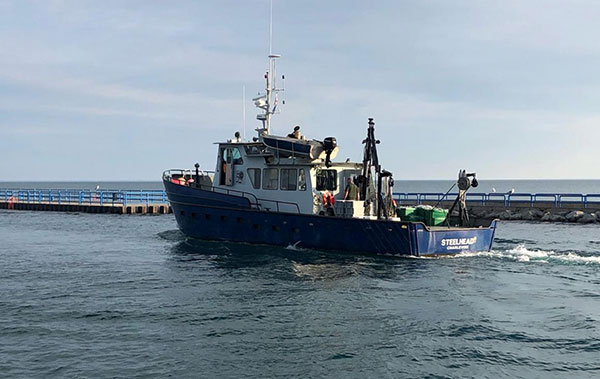MDNR Report
 Great Lakes Research Vessel
Great Lakes Research Vessel
If you're at a Great Lakes port this season, you might see one of the Michigan Department of Natural Resources’ large fisheries research vessels conducting annual fish surveys.
The public is encouraged to visit the vessels when in port and talk with the crews about their work. To ensure the safety of all, anglers and boaters are asked to give research vessels and their deployed sampling gear plenty of space when on the water.
“The staff on these vessels is working on a wide variety of studies to better understand Great Lakes fish communities, population sizes and habitats,” said Gary Whelan, DNR fisheries research manager. “Their work and the knowledge gained are essential to supporting current and future fisheries management.”
The vessels are based out of Marquette, Alpena, Charlevoix and Harrison Township harbors.
Lake Huron
Fisheries surveys on Lake Huron are conducted by the research vessel Tanner. This vessel focuses on the sunrise coast’s lake trout, walleye, yellow perch and forage fish populations, which includes time in Saginaw Bay and the Les Cheneaux Islands in the eastern Upper Peninsula. The R/V Tanner visits the St. Marys River once every five years to evaluate fish communities in collaboration with a number of partner agencies represented by the St. Marys River Fisheries Task Group. The next scheduled survey stop is in August 2022.
Lake St. Clair, Lake Erie
Work on lakes St. Clair and Erie is done by the R/V Channel Cat. This vessel focuses its efforts on walleye, yellow perch, smallmouth bass and lake sturgeon in the waters that support some of the highest fishing effort seen throughout Michigan and the Great Lakes. New for Lake St. Clair this year is a predator fish survey that is part of the recently initiated lakewide fish community assessment – a collaboration among the Michigan DNR, the Ontario Ministry of Northern Development, Mines, Natural Resources, and Forestry, and the U.S. Fish and Wildlife Service.
Lake Superior
Lake Superior surveys are conducted by the R/V Lake Char, which assesses the status of Lake Superior’s self-sustaining lake trout and lake whitefish populations along with other members of the lake’s unique coldwater fish community. The R/V Lake Char's plans for 2022 include a trip to Isle Royale for deepwater lake trout spawning habitat assessment, work at Superior Shoals to tag lake trout with archival tags that record depth and temperature and an assessment of lake trout populations at Big Reef. This vessel is also going to assist with lake trout tagging in support of ongoing assessment of the Buffalo Reef stamp sands evaluation.
Lake Michigan
On Lake Michigan, the survey vessel Steelhead focuses on adult yellow perch, lake whitefish, lake trout, Chinook salmon and forage fish populations. The 2022 sampling year will begin with the spring gill net survey (also known as the lakewide assessment plan, or LWAP). The survey will be conducted at seven ports: St. Joseph, South Haven, Saugatuck, Grand Haven, Arcadia, Leland and Charlevoix. This is a collaborative assessment with other Lake Michigan agencies that has been conducted since 1997; due to the broad scope and multispecies focus, the LWAP survey provides the DNR with the most comprehensive picture of the status of adult Lake Michigan fish populations.
Following the spring survey, the S/V Steelhead will head to Sault Ste. Marie for her five-year haul-out and dry dock work and then return to Lake Michigan in early August to complete the lakewide acoustic survey. This is a multiagency effort to measure the abundance of alewife, rainbow smelt, bloater chub and other prey fish throughout Lake Michigan using hydroacoustic (a high-tech, recordable fish finder) measurements. Results from this survey continue to inform research and management concerning predator/prey balance and lower food web changes (small prey fish, aquatic insects and zooplankton) in Lake Michigan. Additional work in fall 2022 will include the annual lakewide bottom trawl survey, as well as assessments of northern Lake Michigan reefs.
For more information, visit Michigan.gov/FishResearch.